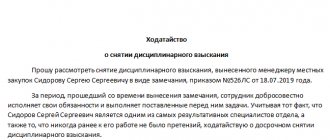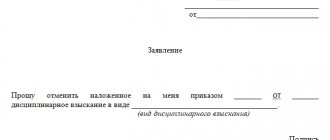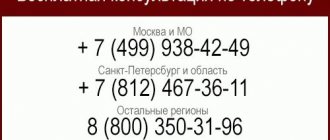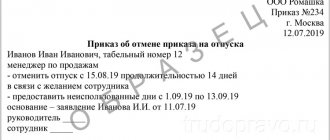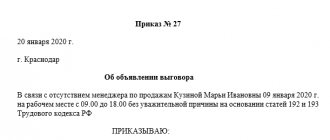What is judicial practice on the abolition of disciplinary sanctions?
The very concept of judicial practice in legal science is rather general theoretical and, it must be admitted, still remains highly controversial.
However, the answers to questions about what acts are included in it and what role it can play in the everyday practical work of appealing and canceling disciplinary sanctions directly depend on what is meant by judicial practice. There are 2 main positions on this issue:
- In the first version, judicial practice on the abolition of disciplinary sanctions represents only legal provisions that arose as a result of repeated and regular resolution by the courts of issues that are not fully and clearly regulated by regulations.
- From the second position, this is the total result of the activities of courts in the application of legal norms, aimed at considering cases and developing acts, including to reveal the meaning of such norms, and the very results of such activities - provisions and acts developed as a result of the activities of the courts.
At first glance, the difference is insignificant, but for law enforcement in any area, including the abolition of a disciplinary sanction, it is huge. Within the framework of the first concept, decisions of the Plenum of the RF Armed Forces cannot relate to judicial practice, although they play a huge role in the work of appealing and canceling disciplinary sanctions. Therefore, it seems correct to follow the second position and include in judicial practice not only regular decisions of courts of all instances on specific cases, but also decisions of the Plenum of the Supreme Court.
You can find more complete information on the topic in ConsultantPlus. Free trial access to the system for 2 days.
The most significant acts of courts on the abolition of disciplinary sanctions
Speaking about the main acts of judicial practice on the abolition of a disciplinary sanction, we should dwell on the resolutions of the Plenum of the Armed Forces of the Russian Federation and the decisions of the Constitutional Court of the Russian Federation, since with their guiding explanations they form a single vector of law enforcement in the country on each individual issue.
Among them it is worth noting:
- Resolution of the Plenum of the Armed Forces of the Russian Federation dated March 17, 2004 No. 2 (hereinafter referred to as Resolution No. 2);
- Resolution of the Plenum of the Supreme Court dated April 14, 2016 No. 13;
- Supreme Court Resolution No. 18-AD17-6 dated March 3, 2017;
- Supreme Court decision No. AKPI14-1384 dated January 23, 2015;
- ruling of the Constitutional Court dated January 26, 2017 No. 32-O (hereinafter referred to as the KS);
- determination of the Constitutional Court of the Russian Federation dated June 23, 2015 No. 1243-O;
- determination of the Constitutional Court of the Russian Federation dated February 20, 2014 No. 252-O;
- appeal ruling of the Constitutional Court of the Russian Federation dated January 17, 2014 No. 46-APG13-16.
Of course, this is far from an exhaustive list of significant acts of judicial practice on the application of the abolition of disciplinary penalties, but it allows us to assess how wide the range of issues decided by the courts regarding the abolition of disciplinary penalties is.
Main directions of judicial practice on the abolition of disciplinary punishments
It is obvious that not all acts of judicial practice are aimed at resolving the issue of lifting a particular disciplinary sanction. It is possible to highlight additional areas in which the judicial system operates on the issue under consideration:
- Responses to inquiries about the compliance of the Constitution of the Russian Federation with the norms of the Labor Code and other regulations on the rules, procedure for applying and canceling disciplinary sanctions. For example, the decision of the Supreme Court of the Russian Federation dated January 23, 2015 No. AKPI14-1384 confirmed the legality of the provision on the procedure for remuneration of employees of regional branches of the Federal Social Insurance Fund of the Russian Federation, approved by Order of the Ministry of Labor dated November 16, 2012 No. 536n.
- Providing explanations on the practical application of the norms of the Labor Code and other regulations on disciplinary measures in case of unclear wording or the possibility of their ambiguous interpretation (for example, resolution No. 2).
- Development of practical provisions on the application of legal norms in the presence of gaps in regulatory regulation.
- An explanation of the powers of individual bodies to apply and challenge penalties - for example, in the Supreme Court Resolution No. 18-AD17-6 dated 03.03.2017 (on bodies that impose disciplinary liability - in the article Which bodies impose disciplinary liability?).
- Correction of erroneous decisions of the courts of first and second instance on issues of abolition of disciplinary sanctions in order to form a vector for correct law enforcement.
Judicial practice makes it possible to largely determine the prospects of each specific case of appeal and cancellation of penalties, since with a high degree of probability a similar situation has already been considered before.
Evgeniy Deev
Case No. 2-1704/2014DECISION. In the name of the Russian Federation
September 16, 2014. Serpukhov, Moscow region
Serpukhov City Court of the Moscow Region, composed of presiding judge S.I. Kryuchkov.
with the participation of the plaintiff’s representative Deev E.V.,
representative of the defendant <***** S.V.>,
representative of a third party of the Education Department of the Administration of the Serpukhov Municipal District of the Moscow Region <***** E.V.>, with the secretary of the court session Brinyak E.N., having considered in open court a civil case on the claim of <****** T R.> to MDOU “Z***a” for the removal of disciplinary sanctions and compensation for moral damage,
U S T A N O V I L:
The plaintiff <***** T.R.> filed a lawsuit against the defendant MDOU "Z***a" to declare illegal the order <number> dated March 27, 2014, issued by the head of the MDOU "Z***a" "on imposing a disciplinary sanction on her in the form of a severe reprimand entered into her personal file, and collecting from the MDOU "Z***a" in her favor an amount of 30,000 rubles in compensation for moral damage.
She motivates her demands by the fact that she, <***** T.R.> has been working at the MDOU “Z***a” since <date> as a teacher-psychologist, and previously this preschool institution belonged to a military unit . By order <number> dated 03/27/2014, the plaintiff was subject to disciplinary action in the form of a severe reprimand for failure to comply with order <number> dated 02/04/2014 at the Zvyozdochka MDOU, expressing the requirement to eliminate violations in record keeping by 02/20/2014 year, on the basis of a certificate from B., a specialist from the Center for Psychological, Medical and Social Support of the Serpukhov District addressed to the head of the education department D. about the violations identified during the re-inspection on February 20, 2014.
The plaintiff considers the order <number> dated March 27, 2014 to apply a disciplinary sanction to her as illegal, since the employer did not require an explanation from her before applying a disciplinary sanction. As follows from the order <number> dated March 27, 2014, the reason for its issuance was a certificate dated February 20, 2014 from B., who is the director of the Municipal Educational Institution TsPMSS. That is, according to the defendant, the date of discovery of the offense committed by her is considered to be 02/20/2014. According to Part 3 of Article 193 of the Labor Code of the Russian Federation, disciplinary sanction is applied no later than one month from the date of discovery of the offense, and accordingly, the specified order was issued in violation of the deadlines established by the Labor Code of the Russian Federation. As stated in Part 5 of Article 192 of the Labor Code of the Russian Federation, when imposing a disciplinary sanction, the severity of the offense committed and the circumstances under which it was committed must be taken into account.
The plaintiff is a labor veteran, has significant teaching experience, has not had a single disciplinary sanction during her entire work, only commendations, has been repeatedly rewarded for conscientious work and high performance indicators, and has not violated the requirements of the job description. The plaintiff also believes that the director of the Municipal Educational Institution TsPMSS B. unlawfully drew up a certificate dated February 20, 2014. The plaintiff is not subordinate to this organization and is not its employee. According to clause 5.5 of the Charter of the Municipal State Educational Institution “Center for Psychological-Medical-Social Support”, approved by order <number> dated <date> by the head of the Education Department of the Serpukhov District Administration, the powers of the director of this institution do not include his right to check the activities of employees of other educational institutions. institutions. Due to the illegal actions of the employer, the plaintiff suffered moral damage, which was expressed in her experiences, due to which she developed insomnia and depression.
The plaintiff <***** T.R.> did not arrive at this court hearing, having been duly notified, submitting a statement supporting the claims and transferring powers to her representative E.V. Deev.
Earlier during the trial, the plaintiff <***** T.R.> supported the stated claims in full according to the arguments specified in the statement of claim, explaining that the disciplinary sanction was applied to her in connection with personal hostile relations on the part of the manager . She was indeed familiarized with the order <number> dated 02/04/2014, but she was not provided with a list of violations committed in the opinion of management, which had to be eliminated by February 20, 2014.
Representative of the plaintiff Deev E.V. during the court hearing, he fully supported the claims of his client, explaining that the contested order does not have a specific formulation of the disciplinary offense committed, in the opinion of the defendant, <***** T.R.> Claimed moral damage plaintiff <***** * T.R.> justifies that the actions of the defendant, expressed in disciplinary action, caused her moral suffering, since her reputation as a conscientious worker suffered.
The representative of the defendant MDOU "Z***a" <***** S.V.> at the court hearing objected to the satisfaction of the stated claims, citing the fact that in relation to the plaintiff <***** T.R.> a disciplinary sanction was imposed for her failure to comply with the order <number> dated 02/04/2014 to eliminate violations in record keeping by 02/20/2014. This violation was identified by a specialist from the Center for Psychological, Medical and Social Support of the Serpukhov District, B., who drew up a corresponding certificate addressed to the head of the education department, D., about the violations identified during a re-inspection on February 20, 2014. The corresponding list of documentation to be corrected was brought to the attention of the plaintiff. In addition, <***** T.R.> needed to resolve the issue of putting his office in proper order: arrange it with appropriate visual information, resolve the issue of replacing old furniture, and resolve the issue of purchasing modern educational toys. Thus, <*****> did not comply with the requirements stipulated by the methodological recommendations. Disciplinary action was taken against K. after her recovery. <******> refused to give an explanation for the violations.
A representative of a third party of the Education Department of the Administration of the Serpukhov Municipal District of the Moscow Region <****** E.V.> considered the claims to be unfounded, since <***** T.R.> was rightfully brought to disciplinary liability.
The case materials include the order <number> dated March 27, 2014 “On disciplinary action”, issued by the head of the MDOU “Z***a” <S.V. *****>, who for failure to comply with the order <number> dated 02/04/2014 according to MDOU “Z***a”, expressing the requirement to eliminate violations in maintaining documentation before 02/20/2014, on the basis of B.’s certificate, specialist of the Center for Psychological-Medical-Social Support of the Serpukhov District addressed to the head of the education department D. about the violations identified during a repeat inspection on 02/20/2014, the teacher-psychologist FULL NAME8 was given a severe reprimand, which was entered into the employee’s personal file and a deadline was set until 04/14/2014 for eliminate all identified violations. <***** T.R.> was familiarized with the order on March 27, 2014, and does not agree with the reprimand (case file 4).
According to the text of the order <number> dated February 4, 2014 “On eliminating violations”, a copy of which is presented in the case materials, the educational psychologist <***** T.R.> was obliged to eliminate all violations of documentation in accordance with the presented methodological recommendations of the regional center of psychology and defectology; There are also two entries with the following content: “I refused to sign the order” dated February 10, 2014 and “I have read the order” without a date (case file 53).
From the certificate of the Municipal Educational Institution “Center for Psychological-Medical-Social Support” B. it is seen that, based on the results of a repeated check of the working documents of the educational psychologist of the MDOU “Z***a” <***** T.R.>, the following was revealed: head and the long-term work plan has not been approved by the manager; there are no training programs (instead, methodological material is presented, partially taken from electronic sources, as well as course preparation materials); there is no passport for the office of a teacher-psychologist; the long-term calendar plan is drawn up without deadlines for classes and marks of completion; there is no general work plan for specialists for the year; there is no record of parents attending individual consultations and the date of their holding; the notes are not prepared properly (there is no structure, no date, goals, objectives and equipment are not indicated); the curriculum “Communication with preschoolers” has not been approved by a specialist at the methodological association of educational psychologists; all provided working documents (programs, plans, reports, etc.) are not properly prepared - not approved by the head of the educational institution, there are no personal signatures of the teacher-psychologist, the deadline for completion is not indicated, the structure of the program material is not specified, there is fragmentation and chaos in design, some of the documents look careless and unstructured; plans for individual support of children with disabilities have not been formalized (last entry dated 2011); outdated methodological literature is used (70-90); there is no file cabinet of educational, didactic and methodological material; there is no work plan for self-education; there is no aesthetics in the design of the office (a pile of old furniture, an overabundance of outdated toys); the color scheme used to decorate the office does not meet sanitary standards (dark tones, dull and worn-out colors); it is necessary to update visual information and purchase modern educational games and methodological literature. (case file 5).
Interrogated as a witness, B. confirmed the information set out in the above certificate, showing that this certificate was drawn up on the basis of the documents that were presented to her by the defendant’s administration and, in particular, <***** T.R>.
According to the text of the job description of the teacher-psychologist, the teacher-psychologist reports directly to the head of the preschool educational institution, deputy. head of the VMR and his job responsibilities include: carrying out professional activities aimed at preserving the mental, somatic and social well-being of pupils in the process of education and training in preschool educational institutions; promoting the protection of individual rights in accordance with the Workers' Rights Convention; promoting the harmonization of the social sphere of an educational institution and implementing preventive measures to prevent the occurrence of social maladjustment in students; identifying factors that hinder the development of students’ personality and taking measures to provide them with various types of psychological assistance (psychocorrectional, rehabilitation, advisory); providing advisory assistance to parents of students (persons replacing them), teaching staff in solving specific problems; conducting psychological diagnostics using modern educational technologies; carrying out diagnostic, psychocorrectional, rehabilitation, advisory work, relying on achievements in the field of pedagogical and psychological sciences, developmental psychology and hygiene, as well as modern information technologies; drawing up psychological and pedagogical conclusions based on research materials in order to orient the teaching staff, as well as parents (substitutes) in the problems of personal and social development of students; maintaining documentation in the prescribed form, using it for its intended purpose; participation in the planning and development of developmental and correctional programs of educational activities, taking into account the individual and age-gender characteristics of pupils, in ensuring the level of training of pupils that meets the federal state educational requirements; providing psychological support to creatively gifted students, promoting their development and organizing a developmental environment; determining the degree of developmental disorders (mental, physiological, emotional) in pupils, as well as various types of social development disorders and carrying out their psychological and pedagogical correction; participation in the formation of the psychological culture of pupils, teaching staff and parents (persons replacing them), including the culture of sex education; consulting employees of educational institutions on the practical application of psychology to solve pedagogical problems, increasing the socio-psychological competence of students, teaching staff, parents (persons replacing them); assessment of the effectiveness of the educational activities of teaching staff and teaching staff, taking into account the development of the personality of students; participation in the work of pedagogical, methodological councils, other forms of methodological work, in the preparation and conduct of parent meetings, recreational, educational and other events provided for by the educational program, in the organization and conduct of methodological and advisory assistance to parents (parents); ensuring the protection of life and health of students during the educational process; compliance with labor protection and fire safety regulations; development of measures to improve the psychological and pedagogical conditions of stay of pupils in preschool educational institutions; conducting: individual and group psychological diagnostics of various profiles and purposes in accordance with the work plan, the request of the administration and within the framework of the advisory process: monitoring the nature of the relationships of children in groups and, if necessary, adjusting them; individual work with children in the process of their adaptation to a child care institution; special developmental and correctional activities with students on cognitive, emotional and personal development, including in compensatory groups; trainings for teachers and parents (legal representatives); development and use of: correctional (tested and proprietary) programs and technologies; compliance with professional ethics, maintaining professional secrets, based on the principles of information confidentiality, not disseminating information obtained as a result of diagnostic, preventive, advisory work, if familiarization with it is not necessary to solve specific problems and may cause harm to the child and his environment; generalization and presentation of the experience of their teaching activities for colleagues of preschool educational institutions and other preschool institutions of the city; undergoing a medical examination during non-working hours according to the schedule; The educational psychologist is obliged to: inform the head, deputy head. according to VMR about absence from work due to illness and about starting work after illness or vacation; keep your workplace in perfect condition every day; An educational psychologist, if necessary, is involved in the administration of a preschool educational institution for pedagogical, methodological or organizational work within the established working hours. (case sheet 47-51).
Based on the results of the review-competition of offices of educational psychologists of the Serpukhov municipal district of the Education Department of the Administration of the Serpukhov municipal district dated May 17, 2013 <number> <****** T.R. awarded a diploma in the category “Traditions in the Profession” (case file 29).
According to the copies of certificates of incapacity submitted to the case materials, <***** T.R.> was on outpatient treatment from <date> to <date>, from <date> to <date> and from <date> by <date> (case sheets 30-34).
From an extract from the medical history of an inpatient patient, <*****T.R.> sees that she was in hospital treatment from <date> to <date> with a diagnosis of <data taken> (case file 35 ).
The case materials include the Charter of the Municipal Educational Institution "Center for Psychological, Medical and Social Support", the founder of which is the municipal formation "Serpukhov Municipal District" of the Moscow Region, the functions and powers of which on behalf of the municipal entity are exercised by the Administration of the Serpukhov Municipal District represented by the Education Department of the Serpukhov Administration municipal district (case sheet 36-45).
According to the act dated March 25, 2014, drawn up by the deputy head of administrative affairs G., deputy head of safety V., teacher S., at the appointed time until 12.00 o’clock. On March 25, 2014, the educational psychologist did not provide the head of the MDOU <***** S.N.> with an explanatory note on the certificate from specialist B. dated February 20, 2014 (case file 54).
Also included in the case file is an act dated February 21, 2014, stating that the educational psychologist <****** T.R.> was absent from the workplace <date> from 7.40 to 12.04 hours. (case file 55).
According to the employment contract <number> dated <date> and a copy of the work record book, <****** T.R.> was accepted into the MDOU “Z***ka” for the position of teacher-psychologist (case sheet 60 -66, 67-71).
According to an extract from the Unified State Register of Legal Entities, MDOU "Z***a" is an active legal entity registered on <date>, the head of which, on the basis of an order for employment <number> dated <date>, is <****** S.V.> (case sheet 76, 77-82).
Having heard the explanations of the plaintiff, his representative, the representative of the defendant, the testimony of a witness, and examined the written materials of the case, the court considers it possible to satisfy the claims in terms of lifting the disciplinary sanction and compensation for moral damage.
According to Article 382 of the Labor Code of the Russian Federation, bodies for considering individual labor disputes. Individual labor disputes are considered by labor dispute commissions and courts. Based on Article 392 of the Labor Code of the Russian Federation, an employee has the right to go to court for resolution of an individual labor dispute within three months from the day he learned or should have learned about a violation of his rights, and in disputes about dismissal - within one month from the date handing him a copy of the dismissal order or from the date of issue of the work book. The employer has the right to go to court in disputes regarding compensation by the employee for damage caused to the employer within one year from the date of discovery of the damage caused. If, for good reason, the deadlines established by parts one and two of this article are missed, they may be restored by the court.
In accordance with Article 192 of the Labor Code of the Russian Federation, for committing a disciplinary offense, that is, failure or improper performance by an employee through his fault of the labor duties assigned to him, the employer has the right to apply the following disciplinary sanctions: reprimand, reprimand, dismissal on appropriate grounds. The application of disciplinary sanctions not provided for by federal laws, charters and regulations on discipline is not permitted. When imposing a disciplinary sanction, the severity of the offense committed and the circumstances under which it was committed must be taken into account.
According to Article 193 of the Labor Code of the Russian Federation, before applying a disciplinary sanction, the employer must request a written explanation from the employee. If after two working days the employee does not provide the specified explanation, then a corresponding act is drawn up. Failure by an employee to provide an explanation is not an obstacle to applying disciplinary action. Disciplinary action is applied no later than one month from the date of discovery of the misconduct, not counting the time of illness of the employee, his stay on vacation, as well as the time required to take into account the opinion of the representative body of employees.
A disciplinary sanction cannot be applied later than six months from the date of commission of the offense, and based on the results of an audit, inspection of financial and economic activities or an audit - later than two years from the date of its commission. The specified time limits do not include the time of criminal proceedings. For each disciplinary offense, only one disciplinary sanction can be applied. The employer's order (instruction) to apply a disciplinary sanction is announced to the employee against signature within three working days from the date of its publication, not counting the time the employee is absent from work. If the employee refuses to familiarize himself with the specified order (instruction) against signature, then a corresponding act is drawn up. A disciplinary sanction can be appealed by an employee to state labor inspectorates or bodies for the consideration of individual disputes.
According to Art. 21 of the Labor Code of the Russian Federation, an employee, in accordance with the employment contract concluded with him, is obliged to conscientiously fulfill his labor duties and observe labor discipline.
As established during the trial, the plaintiff has been in an employment relationship with the defendant as an employee in the position of a teacher-psychologist since <date>, performing the labor duties stipulated by the contract, using methodological recommendations corresponding to her position. By order <number> of March 27, 2014 “On disciplinary action,” a disciplinary sanction was applied to the plaintiff in the form of “... a severe reprimand entered into a personal file” with the wording “For failure to comply with the order <number> of February 4, 2014 to MDOU "Z***a", expressing a requirement to eliminate violations in maintaining documentation until February 20, 2014, on the basis of a certificate from B., a specialist from the Center for Psychological, Medical and Social Support of the Serpukhov District addressed to the head of the education department D. about the identified violations in re-inspection on February 20, 2014.” By order <number> of February 4, 2014 “On Eliminating Violations,” the plaintiff was obliged to eliminate all violations in maintaining documentation by February 20, 2014 in accordance with the presented methodological recommendations of the regional center of psychology and defectology. The disciplinary sanction applied and the procedure preceding its application comply with current labor legislation.
However, both in the wording defining the disciplinary offense of employee <*****>, and in the documents presented by the defendant, in particular, the order <number> dated <date>, there is no information that allows us to judge the presence of specific violations committed it was K. who, in the performance of her job duties, needed to be eliminated, and she had the opportunity to independently eliminate them without the consent of the employer’s manager and the specified methodological center. The absence of the above information, the obligation to provide which, in accordance with the principle of the presumption of good faith of the employee, lies with the defendant, does not allow us to establish with absolute certainty the presence of a disciplinary offense in the actions of the plaintiff, in connection with which the court considers it possible to satisfy the claim for the removal of the disciplinary sanction.
In addition, when applying this type of disciplinary sanction in the form of a reprimand, the employer did not take into account the severity of the offense committed, in the opinion of the defendant, and the circumstances in which it was committed - any comments on the performance of labor duties and, in particular, on the performance of the necessary Before the case under consideration, <******> received no documentation from either the employer or the persons who were covered by the plaintiff’s pedagogical and psychological activities; on the contrary, the case materials contain documents confirming the professional attitude of <**** **> to their work responsibilities.
According to Art. 237 of the Labor Code of the Russian Federation, moral damage caused to an employee by unlawful actions or inaction of the employer is compensated to the employee in cash in amounts determined by agreement of the parties to the employment contract. In the event of a dispute, the fact of causing moral damage to the employee and the amount of compensation for it are determined by the court, regardless of the property damage subject to compensation. When determining the amount of compensation for damage, the requirements of reasonableness and fairness must be taken into account. The nature of moral suffering is assessed by the court taking into account the actual circumstances in which the moral harm was caused. Taking into account the circumstances of the case, the degree of moral suffering, as well as the financial situation of the defendant, which is a municipal educational institution, the court considers it reasonable and fair to recover from the defendant in favor of the plaintiff compensation for moral damage in the amount of 5,000 rubles.
Having examined the plaintiff’s arguments about the defendant missing the deadline for applying a disciplinary sanction and the defendant’s application of a disciplinary sanction not provided for by labor legislation, the court considers it possible to disagree with it. Indeed, in accordance with Article 193 of the Labor Code of the Russian Federation, disciplinary sanction is applied no later than one month from the date of discovery of the misconduct. However, as it was established during the trial, the deadline for execution of the order <number> was set from February 4 to February 20, 2014; On February 20, 2014, an inspection was carried out by specialist B.; from February 21 to March 14, 2014 inclusive <***** T.R>. was on outpatient treatment; In the period from March 15 to March 27, 2014, an inspection procedure was carried out in accordance with the above requirements of labor legislation, and on March 27, 2014, the contested order was issued. Thus, the beginning of the period established by Article 193 of the Labor Code of the Russian Federation must be calculated from March 15, 2014, that is, after the plaintiff completed outpatient treatment. The wording “a severe reprimand entered into a personal file” cannot be an independent basis for canceling the order to apply this disciplinary sanction, since the defendant formally and actually applied the disciplinary sanction provided for by the current labor legislation - “reprimand”.
By virtue of Art. 103 of the Code of Civil Procedure of the Russian Federation, the costs of the state duty are subject to recovery from the defendant.
Based on the above, on the basis of Articles 192, 193, 382, 392, 237 of the Labor Code of the Russian Federation, Article 103 of the Code of Civil Procedure of the Russian Federation and guided by Art. Art. 167, 194-199 Code of Civil Procedure of the Russian Federation
DECIDED:
Satisfy the claims.
Remove the disciplinary sanction in the form of a severe reprimand, applied by order of the head of the MDOU “Z***a” for <number> dated March 27, 2014 to the plaintiff <***** T.R.>.
To recover from the defendant MDOU "Z***a" in favor of the plaintiff K.T.R. 5,000 rubles as monetary compensation for moral damage.
To collect from the defendant MDOU "Z***a" a state duty in the amount of <data taken>.
The decision can be appealed to the Moscow Regional Court through the Serpukhov City Court of the Moscow Region within a month from the date the decision was made in final form.
Presiding Judge S.I. Kryuchkov
The reasoned decision was drawn up on October 2, 2014.
The practical role of judicial acts for appealing a disciplinary sanction
Judicial practice on disciplinary sanctions is not only decisions of courts of first or second instance on specific cases, but also a whole series of generalizations and explanations of the Plenum and Presidium of the Armed Forces of the Russian Federation, which have a leading role.
Such important acts, while not being a source of law, play an important role in practice, since they can be used to appeal disciplinary sanctions in court. They can be referred to directly in the process of appealing disciplinary sanctions. At the same time, judges are obliged in their practice to be guided by explanatory and generalizing acts of the highest judicial bodies, such as resolutions of the Plenum of the Supreme Court of the Russian Federation.
Of course, acts of lower courts do not have such guiding significance. However, it is at this level that legal positions begin to take shape, which are then reflected in governing regulations and legislation.
For example:
- the employer does not have the right to dismiss an employee earlier than 2 days, relying on the expectation of an explanation from him (appeal ruling of the Novgorod Regional Court dated October 10, 2012 in case No. 2-755-33-1600);
- dismissal is permitted solely for guilty actions, and the employer finds out and proves the guilt of the employee (appeal ruling of the Samara Regional Court dated 05.23.2017 in case No. 33-6225/2017, appeal ruling of the St. Petersburg City Court dated 04.10.2012 No. 33-3962/2012 ).
The court's decision
By the decision of the court of first instance, the claims of the former employee were partially satisfied. The court declared illegal the order of the organization to impose a disciplinary sanction on the plaintiff in the form of dismissal and ordered the defendant to change the wording and grounds for dismissal from clause 5 of Article 81 of the Labor Code of the Russian Federation “repeated failure by an employee to fulfill work duties without good reason, if he has a disciplinary sanction” to clause 3 Article 77 of the Labor Code of the Russian Federation “at the initiative of the employee.” The Smolensk Regional Court, in its appeal ruling dated February 14, 2021 in case No. 33-2561/2017, supported the position of its colleagues and left the decision of the trial court unchanged.
The judges indicated that according to the provisions of Article 193 of the Labor Code of the Russian Federation, the employer is obligated to demand a written explanation from the employee regarding the commission of a disciplinary offense. Therefore, a disciplinary sanction, including in the form of dismissal, can be applied to an employee only after receiving an explanation from him in writing or after the employee fails to provide such an explanation (refusal to provide an explanation) after two working days from the date of its request. In a controversial situation regarding the last misconduct of the plaintiff, which led to his dismissal, before issuing an order to impose disciplinary liability, the employer did not request an explanation of all the facts of violations that served as the basis for disciplinary liability. Thus, the organization violated the provisions of labor legislation in such situations. The employee’s right to provide an explanation to the employer was violated, which means the dismissal was illegal.
Conclusions of courts on disputes regarding the abolition of disciplinary sanctions
It is worth noting the most important provisions and explanations that are actively used by professionals when defending their positions. As examples of the most significant clarifications, it is worth noting the following:
- Proving the legality of applying a disciplinary sanction rests with the employer. At the same time, the employer is also obliged to prove that the punishment applied is adequate to the severity of the offense and the indicators of the employee’s past work activity (clause 23 of Resolution No. 2). If a violation of this principle is discovered in court, the penalty is subject to cancellation.
- An employee’s refusal to perform labor duties in conditions dangerous to his life and health cannot be considered a disciplinary offense, except in cases expressly established by law (clause 19 of Resolution No. 2). In this case, the imposed punishment is subject to cancellation according to paragraph 33 of Resolution No. 2.
- In a decision to cancel a disciplinary sanction, the court must justify its position, indicating the part and article of the relevant normative act.
- Clause 37 of Resolution No. 2 contains fundamentally important clarifications on the possibility of canceling disciplinary sanctions for an employee’s refusal to enter into an agreement on full financial liability. Penalties imposed for the employee’s refusal to conclude such an agreement are subject to cancellation if the need to conclude it arose after the conclusion of the employment contract due to changes in current legislation.
***
It remains to conclude that judicial practice significantly helps in the practical work of lawyers to abolish disciplinary sanctions and provides a number of significant clarifications regarding the application of labor law norms where they are formulated ambiguously or have gaps. You can read about disciplinary action here: Disciplinary action under the Labor Code of the Russian Federation - types and grounds.
The essence of the dispute
The citizen filed a lawsuit against the employing organization to declare the orders imposing disciplinary action and dismissal on him illegal, as well as to change the wording of the grounds for dismissal. He indicated that he worked in the organization on the basis of an employment contract. Due to failure to fulfill official duties, the director of the organization reprimanded him. Later, due to violation of clause 5.1. According to the internal labor regulations of the organization, the plaintiff received a reprimand from the employer, and by the third order he was dismissed on the basis of paragraph 5 of Article 81 of the Labor Code of the Russian Federation for improper execution of job regulations. The plaintiff believes that his actions do not constitute this disciplinary offense.
